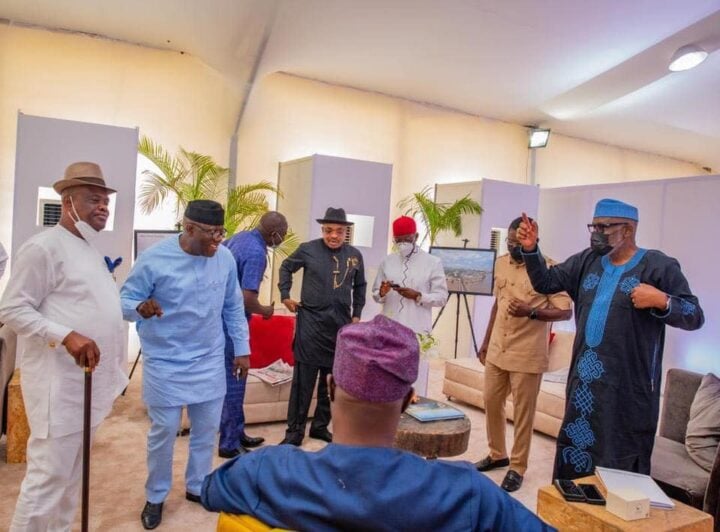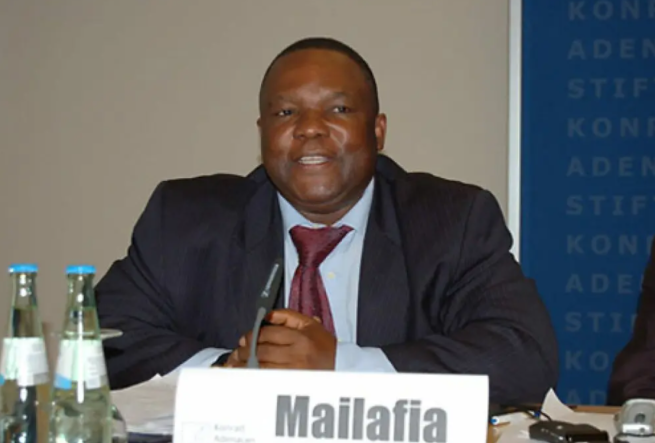After their recent meeting in Enugu, it is no longer in doubt where the southern governors stand on the matters agitating their minds: they want a “re-structured” Nigeria. Their demands include a ban to open grazing; the presidency shifting to the southern region at the next elections in 2023, and lately, “fiscal federalism” which gained momentum recently with the Value Added Tax (VAT) legal battle spearheaded by Governor Nyesom Wike of Rivers State.
This matter will be decided ultimately at the Supreme Court and the lawyers for both parties are set for what will become a titanic battle. Except the constitution is amended according to some legal experts, there is no way the Federal Inland Revenue Service (FIRS) will win the case because consumption tax is not on the exclusive legislative list. Lagos and some other states are joining Rivers State in the battle for “fiscal federalism”.
The idea behind the meetings convened by the southern governors is very timely and laudable. It may be seen as a regional gathering but as far as the governors are concerned, the absence of equity, fairness and justice gives rise to social tension. The reason for the forum, in my view, is that the governors do not want the tension to get to boiling point before they act. They want to become a force for good to save the soul of Nigeria which they see as a constitutional obligation.
Whether we agree with the governors or not, they are very serious about pushing their agenda forward. Prominent on their shopping list is the creation of state police in view of our security challenges. Boko Haram and its various franchises have continued to wage war on Nigerians.
Advertisement
Suddenly, “bandits” and “unknown gunmen” have become part of our daily lexicon – no place is safe anymore. The security situation, in spite of the best efforts of the federal government, is becoming dire by the day. Kidnapping for ransom is still a thriving industry and frequent neighbourhood attacks and robberies in broad daylight – including slow moving traffic or bus stop robberies – are on the increase. Motor bike riders facilitate most of the robberies and attacks.
A family friend who works in a bank told my wife recently that she is worried about the future of her young children in Nigeria. “I’m becoming very uncomfortable with the level of hardship, inflation, insecurity and value of the naira,’ she complained to my wife.
An associate in his mid-thirties said he never wanted to live outside Nigeria but he now wants the opportunity to emigrate. “There’s no hope to hold on to,” he told me, feeling disappointed and let down by our leaders.
Advertisement
Although I tried not to discourage him because he had his mind made up, but I let him know that obtaining an immigrant visa was not going to be easy. After COVID-19 made international travel unattractive, even obtaining a visitor’s visa to favourite destinations was becoming a hard nut to crack. Getting a visa appointment means staying at the end of a long queue of applicants – sometimes waiting for three years!
Too often, the scenario painted these days – by young and old people – is that the future of Nigeria is bleak. This should not be surprising anymore with the behaviour of our politicians. At the rate they are leaving for the All Progressives Party (APC), will Nigeria not become a one party state?
I’m not surprised that Chief Femi Fani-Kayode decamped from the People’s Democratic Party (PDP) to APC; it is just the way of politicians – a matter of bread and butter. How many Nigerian politicians have integrity?
After all the things Fani-Kayode said about not going back to APC, and that it will be over his dead body, should it be shocking to you that he went back to his vomit? It shouldn’t be and we must learn to make allowance for surprises.
Advertisement
As the late foremost journalist Dele Giwa once wrote, “Nigerians have been shocked to a state of ‘unshockability’.” Yes, that is very true. Nothing shocks us anymore. I was not also shocked when I watched the short video clip that has gone viral of Rotimi Amaechi, Minister of Transportation.
During the Channels TV interview, Amaechi complained of Nigerians in high places that “share in corruption but are busy dancing about it.” In his corruption allegation against Chief Femi Fani-Kayode, Amaechi was very direct. “When Fani-Kayode was Minister of Aviation, Dr Peter Odili’s government gave him N2 billion naira to fix the airport runway in Port Harcourt that was closed for two years but he went away with the money.”
He told Maupe Ogun-Yusuf, the interviewer, that he was not making an allegation but disclosing facts about the huge sum of money paid to Chief Fani-Kayode for a job that was not done. Amaechi went on to say that he was not on the same level with Fani-Kayode, but here’s the clincher: “He’s not the kind of character that I would speak to.”
But now that Fani-Kayode and Amaechi are in the same party, would the matter go away as a “family dispute” or would there be more revelations? Will Amaechi not “speak” to the new APC returnee, Fani-Kayode? I’m truly interested in how this matter will end because N2 billion cannot just grow wings and disappear – it is a lot of money belonging to the hardworking tax payers of Rivers State.
Advertisement
We need strong voices and men of character like Amaechi to speak up. It took a lot of courage for the honourable minister to go on television to make the damning allegation against Fani-Kayode although he said he has evidence.
After the shocking revelation of Amaechi on national television, President Muhammadu Buhari should not have received returnee Fani-Kayode in the hallowed chamber of Aso Villa.
Advertisement
It was a big mistake as the recognition which Fani-Kayode craved for would be interpreted around the world as endorsement of corruption by the President with consequential implications for the image of the country.
The way some governors moved from PDP to APC shows that there is no difference between the parties – they are two sides of the same coin. Politicians are playing mind games and positioning themselves strongly ahead of the politics of 2023.
Advertisement
If more and more Nigerians are leaving the country out of frustration and lack of redeeming hope for greener pastures elsewhere, it is because politicians and their associates have refused to conduct themselves properly. Obscene wealth is often displayed when many Nigerians go to bed hungry – no money, no food. The prices of basic food items like garri, rice, beans, meat, fish, pepper and tomatoes have gone through the roof.
This is a matter that should be taken seriously. When people are hungry, nothing else makes sense. Politicians should not always go away with the feeling that they can bribe their way up with bags of rice or salt or Ankara or N5,000 to capture votes.
Advertisement
With inflation at 17% and the free fall of the naira to boot arising from unstable exchange rate of the naira that has been subjected to various manipulations by forex dealers, you would expect our politicians to raise their game to tackle these issues. They are not interested. Their focus right now is to scale up their politics of greed and graft and pursue their ambition to win at all cost in 2023 so that they can continue the ruin they have caused the country.
The southern governors are also politicians like their colleagues in the North and they cannot remove themselves from the looting spree and economic despoliation around us. State governors do not quarrel over security votes because they are all beneficiaries. A governor who spends two terms in office can pocket as much as N50 billion or more in security votes. That’s a lot of money.
As they seek reforms from Abuja in a renewed effort to entrench good governance, the southern governors must understand that they have bigger roles to play at the sub-national level. The starting point is to reduce the cost of governance, become more transparent and reduce their appetite to always borrow money that is not needed.
Their strangle hold on local government administrations is indicative of a master-servant relationship. It should not be so. State and local governments are required to collaborate and take development to every community. They should be partners-in-progress.
From job creation to fixing bad roads, promoting peace, providing access to basic healthcare and education and eradicating poverty and hunger, the sub-national and local governments have their jobs well cut out for them. But corruption, which is endemic at all levels, remains a stumbling block.
Braimah is the Publisher/Editor-in-Chief of Naija Times (https://naijatimes.ng)
Add a comment







